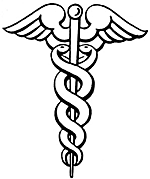caduceus +
(Latin: the wand of a herald, herald's staff; specifically, the wand of Hermes [Greek] and Mercury [Latin])
2. An insignia of a caduceus meant, mistakenly, to symbolize a physician.
The caduceus served as the symbol of Hermes and Mercury, the Greek and Roman messenger gods. The caduceus was the sign of a herald and hence a logical symbol for the messenger; however, because of a misconception, the caduceus became the insignia of the US Army Medical Corps.

The staff of Aesculapius is a rod, or staff, with only one serpent encircling it and without wings; symbol of medicine and emblem of the American Medical Association, Royal Army Medical Corps (Britain), Royal Canadian Medical Corps and just about all medical doctors and clinics, at least, in Europe.

No wings were necessary since the essence of medicine is not speed. The single serpent that could shed its skin and emerge in full vigor represents the renewal of youth and health; therefore, medicine.
The Latin word caduceus came from the Greek karykeion," from karyx or keryx meaning "herald."
The caduceus with its pair of snakes coiled about each other bears some resemblance to the structure of DNA, the double helix, which was discovered in 1953.
![]() Information about Aesculepius and medical symbols, part 1.
Information about Aesculepius and medical symbols, part 1.
